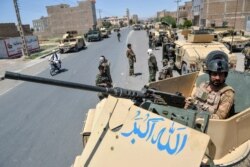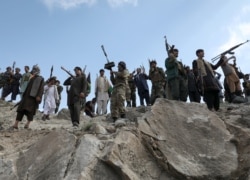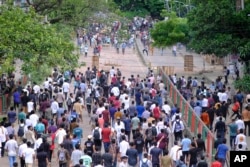Student Union
- By Zohra Moradi
Afghan Fear Complete Taliban Takeover
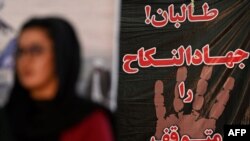
Young people who have spoken against Taliban rule in Afghanistan or who adopted lifestyles that don't fit the fundamentalist regime say they fear for their livelihoods and lives as the insurgent group gains more territory.
"We live in very critical and dangerous circumstances right now," said Murtaza Ahmadi, a writer, part-time teacher and government employee.
"The Afghan government is losing power and authority across the country while the Taliban are gaining," he said. "Thousands of people are leaving Afghanistan because they think the Taliban are slowly gaining power all over the country and they don't trust the Afghan government."
Since international troops started withdrawing from Afghanistan earlier this year, Taliban insurgents have increased attacks against Afghan forces, capturing nearly half of the country's roughly 420 districts. The U.S. military is slated to conclude its mission to Afghanistan by August 31.
The Afghan government insists its forces will retake lost territory. Peace talks between the warring parties have been stalled.
From the start of 2021 to July, according to the U.N. High Commissioner for Refugees (UNHCR), some 270,000 Afghans have been forced from their homes, and more than 3.5 million people internally displaced.
"If the Taliban gain power," he said, "I will be one of the first people to get beheaded because I spoke out about their brutality in my book, The Dream Seller: Bakhshinda Roya."
Ahmadi was in Kabul when the Taliban ruled from 1996 to 2001, and remembers it well, he said. He wrote his book because "I wanted the present generation to be aware of how brutal life was under the Taliban," he said. "Women had to wear burqas, could not leave the house without a man, or go to work, or get an education. Men had to grow beards."
In a recent interview with the Associated Press, Taliban spokesman Suhail Shaheen claimed that under any Taliban government, women will be allowed to work, go to school, and participate in politics, but will have to wear the hijab, or headscarf.
Still, many young Afghans say they are considering leaving their country as 20 years of U.S. military intervention draws down, and the Taliban advances across the countryside.
Thousands of Afghans who may be targets of Taliban violence due to U.S. affiliations but are not eligible for a Special Immigrant Visa (SIV) will have the opportunity to resettle as refugees in the United States, the State Department said Monday.
"When you live in Afghanistan you do not know what will happen to you within an hour," said Bakhteyar Atify, a makeup artist in Kabul whose trade is forbidden under the Taliban's Islamic law. "We always worry and stress about our tomorrow: losing our job, dying of hunger, or stepping into an explosion and dying or becoming disabled," he described. "Almost everyone has depression and mental illness. It is all because of hopelessness for their futures."
Atify, based in the capital city of Kabul, has been working for TOLO TV for the past decade. He said he doesn't see a future for his work or lifestyle if the Taliban takes full control of Kabul and Afghanistan.
"For the past 15 years, I worked so hard to become a great makeup artist by watching other makeup artists, taking their tutorials, following them on social media, and learning online," he said. "They will all be destroyed if the Taliban with its harsh policies come to Kabul."
Atify said he does makeup for women announcers, actors and singers.
"My photos are all over social media. I will be the first to be beheaded by the Taliban because my work is forbidden by them."
After four decades of war, more than 70% of Afghanistan's population is younger than 25.
Mustafa Shirzad, who works in the Afghan Ministry of Finance in Kabul, says that he has lost hope and motivation for his future.
"If the Taliban gain power, their ideology is very different from mine, and I don't think I can work under the Taliban regime because I studied abroad and I have different expectations. If this happens, I will leave," he said. "Our bright and working people will leave if they take control. If I know that they are taking control of Kabul, and I am in danger, I won't think for a minute to leave."
Fatima Airan also works in Kabul in the Ministry of Finance, and like Shirzad, she studied abroad.
"Working women are scared that they might not be able to continue with their education and jobs," she stated. "Everyone is trying to find a way to leave the country, especially people who spoke against the Taliban and talk about their brutalities."
Since the violence increased across the country in May and June 2021 — when the United States and NATO allies began their troop withdrawal — 783 civilians have been killed and 1,609 others wounded, the U.N. Assistance Mission in Afghanistan stated.
See all News Updates of the Day
Tips for first-year international students in the US
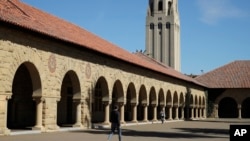
Book your flights right away, get a U.S. phone plan, make sure you have linens for your dorm and attend orientation – that’s some of the advice international students have for first-year college students coming from abroad.
U.S. News & World Report compiled helpful tips for students studying in the United States for the first time. (July 2024)
Survey: Social integration, career prep are important to international students
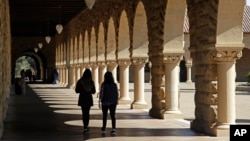
A recent survey of international students in the United States found that before starting school, they were concerned about personal safety, making friends and feeling homesick.
Inside Higher Ed reports that international students want specialized orientations, peer connections, career preparation and job placement to help make their college experiences successful. (July 2024)
US advisory council ends Nigeria visit, signs student exchange deal
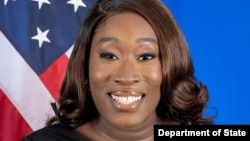
Members of a U.S. presidential advisory council have approved a student exchange deal between an American college and a Nigerian university as part of the council's effort to strengthen collaboration on education, health, entrepreneurship and development between Africa and Africans living abroad.
The council also visited a health facility supported by the United States Agency for International Development in the capital.
Nigerian authorities and visitors chatted with members of the U.S President's Advisory Council on African Diaspora Engagement as they toured a healthcare facility in Karu, a suburb of Abuja, on the last day of the council's three-day visit to Abuja and Lagos.
The facility is one of many supported by the United States Agency for International Development, or USAID, to improve the management of childhood illnesses, family planning, immunization and delivery.
The tour was part of the council's effort to promote African diaspora-led investments in technology entrepreneurship, education and healthcare delivery.
"They're doing a phenomenal job there, it really gave us a sense of what the healthcare system is in Nigeria," said Deniece Laurent-Mantey, executive director of the advisory council. "This is our first trip as a council to the continent and we chose Nigeria for a reason — the diaspora in Nigeria is very active, very influential, and they're really a source of strength when it comes to our U.S.-Africa policy. And so for us coming to Nigeria was very intentional."
The council was created by President Joe Biden in September to improve collaboration between Africa and its diaspora in terms of economic and social development.
Akila Udoji, manager of the Primary Healthcare Centre of Karu, said officials in Nigeria were pleased that the council members were able to visit.
"We're happy that they have seen what the money they have given to us to work with has been used to do, because they have been able to assist us in capacity-building, trainings, equipment supply and the makeover of the facility," Udoji said.
Earlier, the council signed a deal for a student exchange program between Spelman College in the southern U.S. city of Atlanta and Nigeria's University of Lagos.
Laurent-Mantey said education exchanges are one of the council's top priorities.
"In Lagos, we had the president of Spelman College — she's also a member of our council — she signed an agreement with the University of Lagos to further education exchange programs in STEM and creative industries between those two universities," Laurent-Mantey said. "And I think for us it's very important, because Spelman College is a historically Black university, and so here we are promoting the importance of collaboration between African Americans and Africans."
In March, the advisory council adopted its first set of recommendations for the U.S. president, including the student exchange initiative, advocating for more U.S. government support for Africa, climate-focused initiatives, and improving U.S. visa access for Africans.
The council met with Nigerian health and foreign affairs officials during the visit before leaving the country on Wednesday.
American Academy of the Arts College announces closure
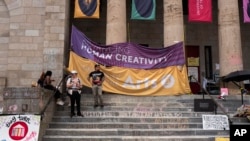
The American Academy of Art College in Chicago announced it would be closing after 101 years of preparing students for careers in art and illustration.
WTTW news reported that like other art colleges, the academy saw enrollment drop after the pandemic, and officials made the decision to close the college last month. (July 2024)
5 killed, dozens injured in clashes over Bangladesh jobs quota system
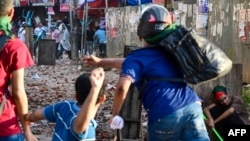
At least 5 people were killed and dozens injured in two separate incidents in Bangladesh as violence continued Tuesday on university campuses in the nation's capital and elsewhere over a government jobs quota system, local media reports said quoting officials.
At least three of the dead were students and one was a pedestrian, the media reports said. Another man who died in Dhaka remained unidentified.
The deaths were reported Tuesday after overnight violence at a public university near Bangladesh's capital, Dhaka. The violence involved members of a pro-government student body and other students, when police fired tear gas and charged the protesters with batons during the clashes, which spread at Jahangir Nagar University in Savar, outside Dhaka, according to students and authorities.
Protesters have been demanding an end to a quota reserved for family members of veterans who fought in Bangladesh's war of independence in 1971, which allows them to take up 30% of governmental jobs.
They argue that quota appointments are discriminatory and should be merit-based. Some said the current system benefits groups supporting Prime Minister Sheikh Hasina. Some Cabinet ministers criticized the protesters, saying they played on students' emotions.
The Bengali-language Prothom Alo daily newspaper reported that one person died in Dhaka and three others, including a pedestrian, were killed after they suffered injuries during violence in Chattogram, a southeastern district, on Tuesday.
Prothom Alo and other media reports also said that a 22-year-old protester died in the northern district of Rangpur.
Details of the casualties could not be confirmed immediately.
While job opportunities have expanded in Bangladesh's private sector, many find government jobs stable and lucrative. Each year, some 3,000 such jobs open up to nearly 400,000 graduates.
Hasina said Tuesday that war veterans — commonly known as "freedom fighters" — should receive the highest respect for their sacrifice in 1971 regardless of their current political ideologies.
"Abandoning the dream of their own life, leaving behind their families, parents and everything, they joined the war with whatever they had," she said during an event at her office in Dhaka.
Protesters gathered in front of the university's official residence of the vice chancellor early Tuesday when violence broke out. Demonstrators accused the Bangladesh Chhatra League, a student wing of Hasina's ruling Awami League party, of attacking their "peaceful protests." According to local media reports, police and the ruling party-backed student wing attacked the protesters.
But Abdullahil Kafi, a senior police official, told the country's leading English-language newspaper Daily Star that they fired tear gas and "blank rounds" as protesters attacked the police. He said up to 15 police officers were injured.
More than 50 people were treated at Enam Medical College Hospital near Jahangir Nagar University as the violence continued for hours, said Ali Bin Solaiman, a medical officer of the hospital. He said at least 30 of them suffered pellet wounds.
On Monday, violence also spread at Dhaka University, the country's leading public university, as clashes gripped the campus in the capital. More than 100 students were injured in the clashes, police said.
On Tuesday, protesters blocked railways and some highways across the country, and in Dhaka, they halted traffic in many areas as they vowed to continue demonstrating until the demands were met.
Local media said police forces were spread across the capital to safeguard the peace.
Swapon, a protester and student at Dhaka University who gave only his first name, said they want the "rational reformation of the quota scheme." He said that after studying for six years, if he can't find a job, "it will cause me and my family to suffer."
Protesters say they are apolitical, but leaders of the ruling parties accused the opposition of using the demonstrations for political gains.
A ruling party-backed student activist, who refused to give his name, told The Associated Press that the protesters with the help of "goons" of the opposition's Bangladesh Nationalist Party and Jamaat-e-Islami party vandalized their rooms at the student dormitories near the Curzon Hall of Dhaka University.
The family-of-the-veterans quota system was halted following a court order after mass student protests in 2018. But last month, Bangladesh's High Court nulled the decision to reinstate the system once more, angering scores of students and triggering protests.
Last week, the Supreme Court suspended the High Court's order for four weeks and the chief justice asked protesting students to return to their classes, saying the court would issue a decision in four weeks.
However, the protests have continued daily, halting traffic in Dhaka.
The quota system also reserves government jobs for women, disabled people and ethnic minority groups, but students have protested against only the veterans system.
Hasina maintained power in an election in January that was again boycotted by the country's main opposition party and its allies due to Hasina's refusal to step down and hand over power to a caretaker government to oversee the election.
Her party favors keeping the quota for the families of the 1971 war heroes after her Awami League party, under the leadership of her father, Sheikh Mujibur Rahman, led the independence war with the help of India. Rahman was assassinated along with most of his family members in a military coup in 1975.




